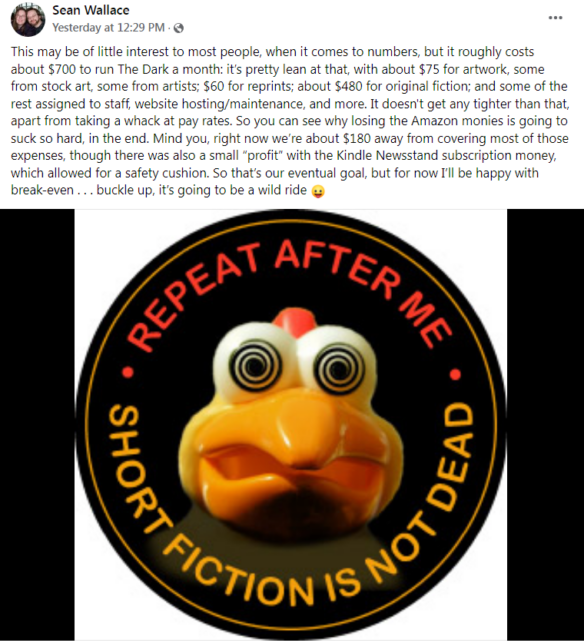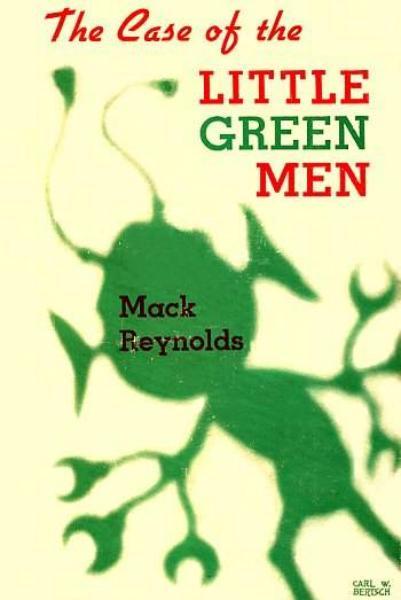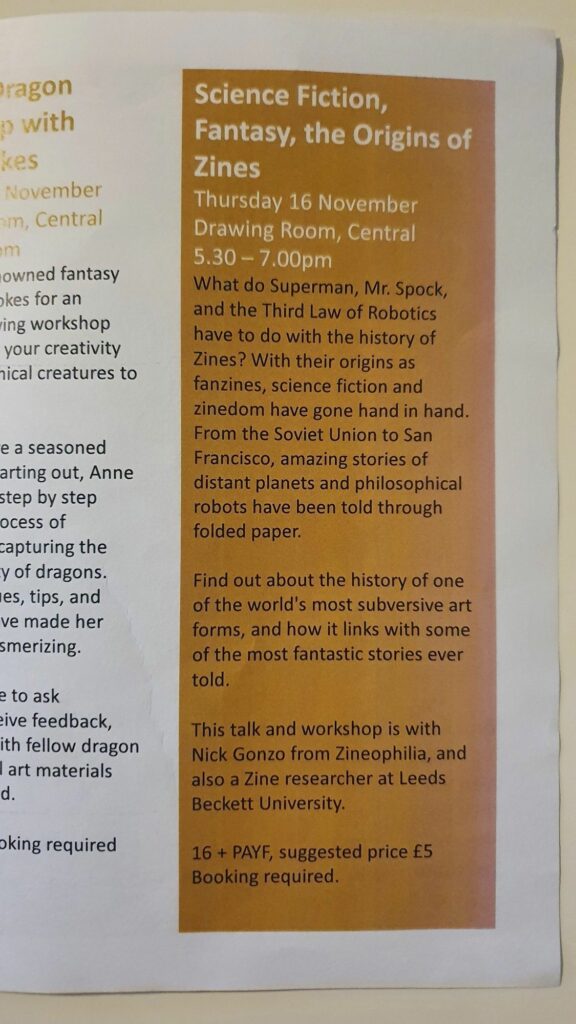(1) CURATOR TAKES SIDES, GETS CANCELLED. An Afrofuturism-themed exhibit “chapter” is the casualty when “German Museum Shutters Curator’s Contribution Over Pro-Palestine Instagram Activity, Igniting Censorship Outcry” reports ArtNews.
… On Monday, writer, professor, and curator Anaïs Duplan, who goes by the pronouns he/they, posted screenshots on Instagram of an email sent to them from Museum Folkwang director Peter Gorschlüter informing them that the institution had decided to “suspend” their “collaboration.”
The email reads: “We noticed that you shared and commented on a number of posts on your Instagram channel in the light of the current situation in Israel and Gaza. From our perspective some of these posts are unacceptable. These posts do not acknowledge the terroristic attack of [Hamas] and consider the Israeli military occupation in Gaza a genocide.”
Gorschlüter continued that Duplan’s engagement put the museum “in a situation that the museum might be considered to support antisemitic tendencies and voices that question the very right of existence of the state Israel.”
The show, titled “We is Future” and slated to open on November 24, invited artists and curators to propose “historic and current” ideas “for alternative forms of living together” in relation to various social catastrophes: climate change, the housing crisis, late-stage capitalism, among others. The “chapters” of the show listed on its webpage include architectural projects from Bruno Taut and Wenzel Hablik, eco-conscious drawings and paintings by Elisàr von Kupffer, and contemporary works by Eglė Budvytytė, Emma Talbot, and Timur Si-Qin.
Duplan’s chapter was centered on the intersectional potential of Afrofuturism and was set to feature, among others, Brooklyn-based artist Fields Harrington, whose multidisciplinary practice examines the inextricability of race from our social fabric. The description of Duplan’s chapter has since been deleted from the webpage…
…The [Museum Folkwang’s] statement continued: “This decision was made neither for artistic-curatorial reasons nor because of the exhibition’s theme, but solely because the curator personally takes sides with the BDS campaign, which questions Israel’s right to exist. The Museum Folkwang views the developments in Israel and Gaza and the suffering of the civilian population on both sides with great concern. The City of Essen and the Museum Folkwang stand for peace and dialogue between cultures.”…
.. Amid an outpouring of support from professional peers, Duplan wrote in an Instagram post Monday that their priorities were “to ensure that any artists in the future—especially BIPOC artists—who are considering working with [the museum] have full transparency regarding their politics, not just in relation to the war on Palestine, but also their very fraught labor practices.”
Duplan added in a separate post Tuesday: “It should go without saying that Afrofuturism and liberation struggles around the world go hand in hand, as do Afrofuturism and antisemitism, Afrofuturism and islamophobia, and Afrofuturism and all other struggles for collective wellbeing.”…
(2) KEEP THE LIGHTS ON AT THE DARK. Last month Sean Wallace told Facebook readers that “for The Dark the loss of Amazon Newsstand effectively resulted in ten thousand dollars of revenue going poof, for the entire year.” Yesterday he wrote about the budget he’s working with to keep the publication afloat. After you’ve read the screencap, here is the subscription page for The Dark Magazine.

(3) HAS YOUR TROPE LOST ITS FLAVOR ON THE BEDPOST OVERNIGHT? Four-time Stoker Award winner Tim Waggoner has written a fascinating discussion about “61 Horror Clichés and How to Make Them Fresh Again” at Writing in the Dark.
…I can choose one element of horror writing that I think will have the most immediate impact on your fiction to talk about – and that’s avoiding and reworking clichés.
A genre has a collective group of character types (both protagonist and antagonist), setting types, story types, etc. These elements are called tropes, and they’re the shared tools genre writers use in their work. In Horror, an abandoned graveyard is a setting trope. A curious, naïve, and ultimately doomed scholar is a character trope. You get the idea. Tropes are effective when they’re first created/used in a story, but the 3000th time? Not so much. (This is one of the reasons readers can get sick of a genre. When they first start reading in it, all the tropes are new to them, and thus interesting and exciting. But after they read a number of books in the genre, they start to realize that the same old tropes are used all the time, and they get bored.) There’s a word for an overused trope that has lost its power and impact.
Cliché.
This is the reason that old pros like me advise new writers to read widely in their chosen genre and seek out the best, most original work via reviews and word of mouth. (This is one of the most useful functions social media serves – it makes you aware of some really cool shit to check out.)…
Here are two of his many ideas.
…Once you’ve identified overused tropes, you can avoid including them in your work. Better yet, you can transform them into something new and powerful. Allow me to elucidate.
Choose a New Signifier
One of the most common tropes in horror is darkness/shadows as a signifier of evil or a threat. It makes sense, since not being able to use one of our strongest senses puts us at a huge disadvantage in a dangerous situation. But darkness has been used so often in horror that it doesn’t have much power anymore. Maybe you could choose a different sense to indicate evil in your story. How about cicada song? Or a slight stickiness on surfaces in a place tainted by evil? (A stickiness that gets worse the closer you get to the source of the evil.) Corvids are used as harbingers or servants of evil in horror. What if you used hummingbirds instead?
Reverse a Trope
Haunted houses are often portrayed as old and abandoned. Let’s reverse this trope. Older houses are safe from hauntings/demonic infestations because they gain psychic shielding from the long-term presence of living beings inside them. So only new structures are susceptible to hauntings/demonic infestations. In Frankenstein, a living being is fashioned from parts of the dead. Reverse this: an immortal being who can instantly heal any injury seeks death by trying to find a way to permanently disassemble their body….
(4) HELP DECIDE THE DIAGRAM PRIZE. The shortlist for the Bookseller Diagram Prize for Oddest Book Title of the Year 2023 is now open for a public vote on The Bookseller website here. The closes December 1, with the winner revealed on the 8th. Here is this year’s Diagram Prize shortlist:
The 12 Days of Christmas: The Outlaw Carol that Wouldn’t Die by Harry Rand (McFarland & Co)
The author of Rumpelstiltskin’s Secret: What Women Didn’t Tell the Grimms looks at how a raucous drinking song became a festive favourite.
Backvalley Ferrets: A Rewilding of the Colorado Plateau by Lawrence Lenhart (University of Georgia Press)
The “beguiling weasel” at the centre of this book is “more than a charismatic minifauna; it is the covert ambassador of a critical ecosystem,” says the author.
Danger Sound Klaxon! The Horn That Changed History by Matthew F Jordan (University of Virginia Press)
Charts the device’s lifespan from “metallic shriek that first shocked pedestrians” to its use in the trenches in the First World War.
Dry Humping: A Guide to Dating, Relating, and Hooking Up Without the Booze by Tawny Lara (Quirk Books)
The only non-academic contender is a “judgement-free” handbook from a podcaster and self-described “sober sexpert”.
I Fart in your General Direction: Flatulence in Popular Culture by Don H Corrigan (McFarland & Co)
“Covers every aspect of abdominal gas” in movies, music and TV, combined with “philosophical positions on colonic expression”.
The Queerness of Water: Troubled Ecologies in the Eighteenth Century by Jeremy Chow (University of Virginia Press)
An interdisciplinary look at classic canonical works and how “sea, rivers, pools, streams and glaciers all participate in a violent decolonialism”.
(5) HWA-THEMED GAME IS ON THE WAY. An officially-licensed party game called “Sudden Acts of Horror” – coming in 2024 – aims to celebrate the Horror Writers Association, the oldest and most respected professional nonprofit organization in the horror genre. The game asks teams of players to act out made-up horror novel titles to score the highest points and ultimately win a mini–Bram Stoker Award® for their efforts.
“Sudden Acts of Horror” is scheduled for release in the second quarter of 2024 and will be available for purchase at www.stopthekiller.com.

(6) SAVE THE COYOTE. This ain’t over ’til Porky Pig sings… “’Coyote vs. Acme’: Congressman Calls for Federal Probe on Warner Bros Discovery” — Deadline has the story.
…“The @WBD tactic of scrapping fully made films for tax breaks is predatory and anti-competitive,” wrote Castro, who has protested WBD before on antitrust issues.
“As the Justice Department and @FTC revise their antitrust guidelines they should review this conduct,” he continued.
“As someone remarked, it’s like burning down a building for the insurance money,” he added.
…. Several sources have told us that in a cost-cutting, debt-laden environment as Warner Bros Discovery that it’s not CEO David Zaslav to blame here for the axing of the film. Warner Bros. Motion Picture bosses Michael De Luca and Pam Abdy and new animation head Bill Damaschke are the ones who made the decision, this despite the fact that it’s not a production chief’s bandwidth to worry about tax writedowns on a movie. That’s for accounting and finance to sweat over.
The new WBD administration doesn’t want the problem of the previous admin’s greenlights and at $70M, that’s a cost too high for a movie to simply skip theatrical and head to streaming service Max.
While it’s not in production bosses’ nature to worry about tax writeoffs, they realize that there’s a lot of stress over at WBD to win in the wake of having the highest-grossing movie in the studio’s history and YTD with Barbie at $1.4 billion worldwide. A severe financial savings mentality exudes at Warners, and if a film looks too risky to spend marketing on, execs there don’t want to stick their necks out and have a lackluster result and be blamed for a greenlight that wasn’t there….
(7) STARSHIP LAUNCH APPROVED. [Item by Bill.] The FAA and the Fish and Wildlife Service have completed their reviews of SpaceX’s launch plans, issued their final reports, and given approval for the next launch of Starship. The FAA has issued a NOTAM (Notice to Airmen) closing airspace around Boca Chica for Friday November 17. SpaceX appears to be planning for a Friday launch. Gizmodo has further coverage: “SpaceX Granted FAA Permission for Second Starship Test Flight”.
…The FAA’s entire report can be seen here, but in summary, the water deluge system was deemed to be no more threatening to the environment than a summer rain storm:
“…an average summertime thunderstorm at Boca Chica would deposit more water over the landscape than any single or all combined activations of the deluge system. Since the amount of water that is anticipated to reach the mud flats from a maximum operation of the deluge system is expected to be less than an average summer rainfall event, this amount of water would be unlikely to alter water quality.”
With the launch license secured, SpaceX is ready to go. The second launch of Starship is scheduled for Friday, November 17 at 8:00 a.m. ET, with the launch window ending two hours later. Two FAA space TFRs (temporary flight restrictions) are in effect for Brownsville, Texas, one for Friday and a second TFR going into effect at 8:00 a.m. ET on November 18 and ending one hour later….
(8) ANDREW CARNEGIE MEDALS SHORTLIST. The American Library Association has unveiled the 2024 Andrew Carnegie Medals for Excellence in Fiction and Nonfiction shortlist. None of the items are genre works. The winners will be announced on January 20.
Andrew Carnegie Medal for Excellence in Fiction 2024 Shortlist
- “The Berry Pickers,” by Amanda Peters. Catapult. In 1962, an Indigenous Mi’kmaq family is in Maine to pick summer blueberries when their youngest child, four-year-old Ruthie, disappears. Her six-year-old brother, Joe, saw her last. Told in alternating, first-person chapters from Joe and a narrator called Norma, this braided novel fascinates. While little is easy for Peters’ characters, in the end, for all of them, there is hope.
- “Denison Avenue,” by Christina Wong and Daniel Innes. ECW Press.
In a mixed-media narrative saturated with a sense of poignancy and grief, Wong Cho Sum navigates the sudden death of her husband by a hit-and-run driver. As an “invisible” elderly observer, she compares the old Chinatown she remembers with this new, slowly gentrifying one. Innes’ detailed and beautiful hand-drawn illustrations are eye-catching complements to Wong’s writing. - “Let Us Descend,” by Jesmyn Ward. Scribner, an imprint of Simon & Schuster, Inc.
Sold away from her mother, teenage Annis, daughter of a Black mother and the white man who enslaved them, must endure a grueling march to the slave markets of New Orleans with only her wits and her mother’s ivory awl to help her survive. Ward’s vivid imagery and emotionally resonant prose convey the horrors of chattel slavery in stark, unforgettable detail.
Andrew Carnegie Medal for Excellence in Nonfiction 2024 Shortlist
- “The Great Displacement: Climate Change and the Next American Migration,” by Jake Bittle. Simon & Schuster.
This multifaceted examination considers numerous communities that have been wiped out by changing weather patterns and foretells a future filled with additional displacements. Environmental journalist Bittle uses a combination of science reporting and individuals’ stories to explain the fates of towns deemed uninhabitable and ends with a plea for comprehensive environmental policy change and urgent action. - “The Talk,” by Darrin Bell. Henry Holt and Company.
In 2019, Bell became the first Black editorial cartoonist to win a Pulitzer Prize. In this brilliant graphic memoir, Bell’s growth from a trusting child afraid of dogs to an esteemed, nationally syndicated cartoonist is a marvel to witness through his spectacular panels and pages. A must-read manifesto against racist brutality. - “We Were Once a Family: A Story of Love, Death, and Child Removal in America,” by Roxanna Asgarian. Farrar, Straus and Giroux.
Investigative reporter Asgarian’s years of work getting to know the birth families of six children killed by their adoptive parents in 2018 uncovered a devastating web of intergenerational poverty, violence, and wrenching separations. She exposes the tragedy of what happened and the ongoing, insupportable failings of the foster system.
Carnegie Medal winners will each receive $5,000.
(9) MORE FOR MOUNT TBR. TIME Magazine’s list of “The 100 Must-Read Books of 2023” includes several works of genre interest that I recognize, and doubtless others I didn’t which you can name in the comments:
- The Future by Naomi Alderman
- Lone Women by Victor LaValle
- Victory City by Salman Rushdie
- Yellowface by R.F. Kuang
(10) MORE ON MICHAEL BISHOP. The family’s Michael Bishop Obituary has been published. It includes details on Bishop’s life and writing career, and funeral plans.
(11) MEMORY LANE.
1950 — [Written by Cat Eldridge.]
We mentioned Mack Reynolds’ The Case of the Little Green Men in a Scroll recently and there it was noted that it was set at a Con, and that’s all it’ll say about it as there might be someone here who hasn’t read it yet. Now I will ask the question, well two questions actually. Was it the first genre novel set at a Con? And what’s your favorite Con set novel? Or more.
So now let’s talk about The Case of the Little Green Men. It was the first novel by him, published seventy-three years ago by the Phoenix Press who ISFDB lists only one other work being published, Will Garth’s Dr. Cyclops. The cover illustration is by Carl W. Bertsch.
Is the novel fun? Oh yes. Is it really a mystery? Well, that depends on how much you want to stretch your idea of what a mystery is. And I’m surprised it hasn’t been nominated for a Retro Hugo. Really surprised.
To my utter surprise, the publication notes for The Case of the Little Green Men at ISFDB, says it was out of print for sixty-one years until Prologue Books did a new edition. It is available from usual suspects on, and no I’m not pulling your tentacles, Richard A. Lupoff’s Surinam Turtle Press. The website for that is here.
And now for our shortest Beginning ever…
The detective isn’t tough and he isn’t even smart and he doesn’t prove the case against the killer. And boy doesn’t get girl, either. Otherwise, this story is just about like a good many others you’ve read. At least it starts the same way.…
We can’t help it if it dissolves into men from Mars, people who believe in spaceships and flying saucers, murders without motive, and heat rays fired by little green men (or were they?).

(12) TODAY’S BIRTHDAYS.
[Compiled by Cat Eldridge.]
- Born November 15, 1877 — William Hope Hodgson. By far, his best-known character is Thomas Carnacki, featured in several of his most famous stories and at least partly based upon Algernon Blackwood’s occult detective John Silence. (Simon R. Green will make use of him in his Ghost Finders series.) Two of his later novels, The House on the Borderlandand The Night Land would be lavishly praised by H.P. Lovecraft. It is said that his horror writing influenced many later writers such as China Miéville, Tim Lebbon and Greg Bear but I cannot find a definitive source for that claim. (Died 1918.)
- Born November 15, 1933 — Theodore Roszak. Winner of the Otherwise Award for The Memoirs of Elizabeth Frankenstein and the rather excellent Flicker which is well worth reading. Flicker and The Devil and Daniel Silverman is available at the usual suspects, and his only other available fiction is his Japanese folktales. Odd. (Died 2011.)
- Born November 15, 1941 — Daniel Pinkwater, 82. His absolutely best work must be without doubt Lizard Music, an sf novel in which a young boy begins seeing musical lizards all around. Lizards opposing an alien invasion. Oh so perfect a novel.
- Born November 15, 1942 — Ruth Berman, 81. She’s a writer of mostly speculative poetry. In 2003, she won the Rhysling Award for Best Short Poem for “Potherb Gardening”, and in 2016 for “Time Travel Vocabulary Problems”. She was the winner of the 2006 Dwarf Stars Award for her poem “Knowledge Of”. She’s also written the fantasy novel, Bradamant’s quest. In 1973, she was a finalist for the first Astounding Award for Best New Writer. She brings out the Dunkiton Press genre zine annually — over 30 issues and still going strong. She was nominated for Best Fan Writer Hugo at Baycon (1968).
- Born November 15, 1955 — N Lee Wood 68. She was once married to Norman Spinrad. The Mahdi written in 1996 is an interesting take on the situation in the Middle East with AIs thrown into the mix. I’m more fond of her Inspector Keen Dunliffe series of detective novels which are definitely not genre. There’s at least twenty-three to date, and they’ve been adapted for television under the series title of DCI Banks. It’s a most excellent series.
- Born November 15, 1982 — Jessica McHugh, 41. Very prolific horror writer who’s also a playwright. IDFDB says she has written eight genre novels and some forty pieces of shorty fiction to date, the latter gathered in three collections. She won an Imadjinn Award for The Train Derails in Boston novel given by the Con of the same name held in Kentucky every year. Her poetry which apparently is on the dark side of things, of which she’s even written more than she has short fiction, has earned two Stoker nominations.
(13) COMICS SECTION.
- Lio’s local library has some strange books. Of course it does.
(14) GONZO AND GAIMAN TOMORROW. Nick Gonzo says, “If you are in Leeds on Thursday and are looking for something cool to do, I am hosting a workshop with Leeds Library about the history of Scifi and Zines. This is obviously a career high point as I’m sharing an event programme with Neil Gaiman.” Program description and ticket information is in the screencaps below.


(15) LIBRARIANS LAUNCH GAME AWARD. The Games & Gaming Round Table (GameRT) of the American Library Association is seeking nominations for the new Platinum Play Awards as part of its celebration of International Gaming Month. The new award will recognize the best games for use in library collections and library programming. “GameRT seeks nominations of amazing games for its new Platinum Play Awards list!”
Through this award, GameRT will highlight and honor the best games for library collections and programming. The Platinum Play Awards — affectionately called The Platys after the platypus mascot on the new award seal — are planned as an annual award and will recognize up to twenty games each year. GameRT will collect nominations from library workers and patrons each year. Once all nominations are in, GameRT members will be able to vote for their top picks, and games that receive at least two votes will move on to the final assessment round, where they will be evaluated by GameRT’s Platinum Play Award Committee. The final award list will be announced each year, starting with a special Platinum Play Classics Hall of Fame in January 2024 that will celebrate classic games like Chess and Go.
In an effort to help libraries find newer games, only games published between two and ten years prior to the awarding year are eligible. Games will be evaluated based on their ability to provide an enjoyable gaming experience in one hour of play. Eligibility for the award is open for games designed for any age range and any number of players. Games that require a system for play will be considered based on the number of platforms available that libraries can access.
…Nominations for the 2024 Awards — for games published between published between 2013 and 2021 — are open now and can be submitted online until March 31, 2024. Library staff, teachers, and gamers of all types should submit their favorite games using the online nomination form. Game publishers and creators that seek to have their games considered should email GameRT Staff Liaison Tina Coleman at [email protected].

(16) DON’T TOUCH THAT DIAL. The LA Times learns why “Composer John Williams can’t let Indy go to someone else”.
What does an old adventurer have to offer a modern world that seems to have moved on?
That’s the existential question posed to Indiana Jones, the beloved archaeologist immortalized by Harrison Ford across four decades, in “Indiana Jones and the Dial of Destiny.” Indy is creaky, retiring and alone when the fifth and latest chapter opens in 1969 — a man out of time.
It was also a question for John Williams, the venerable composer who gave Indy his infectious march beginning with “Raiders of the Lost Ark” in 1981. Williams was no less than Indy’s galloping tempo and his comic, whip-cracking action, his romantic stirrings and his heroic quest for every previous search for some ancient relic.
Now in his 10th decade, Williams had nothing left to prove and no obligation to score a new “Indiana Jones” film. For the first time, his forever-collaborator Steven Spielberg wasn’t even directing. So why get back in the saddle?
“Very frankly,” Williams says, “I thought to myself: Well, I really don’t want somebody else to do that. It was like when I was doing ‘Star Wars,’ you know. I thought: If I can possibly do it, I should try to do it.”
In other words: Just like Harrison Ford, no one else should wear that hat….
(17) THIS PLANET BITES. Camestros Felapton watched “Scavengers Reign (HBO)” and wrote a review that will make you nervous whenever you hear easy-listening music from now on.
…You could probably make a nice edit of the more relaxed landscape scenes that would be quite relaxing. Indeed, musically from the soft opening titles to much of the incidental music the tone is one that emphasizes the sense of wonder in this alien world.
This sense of wonder is coupled with terror though. The beauty of the world comes with plenty of creatures eager to eviscerate the humans (if they are lucky) or infest them (if they are more unlucky) or turn them into monstrous puppets (if they are even more unlucky). Spores, tentacles, stingers, strangling vines and psychic powers are all out to consume the hapless survivors….
(18) ANOTHER BIZARRE PRODUCT. Archie McPhee has done it again with “Bigfoot Basecamp”.
Some say Bigfoot is an interdimensional traveler who disappears when he wants to, but maybe there are no good pictures of Bigfoot because he’s so tiny. The Bigfoot Basecamp has all the things you need to create the scene of a surprised camper trying to snap a picture as Bigfoot approaches. You can take the itty bitty soft vinyl figures, between 1/2″ and 1-3/8″ tall, out of the box and play with them or leave them inside as a desktop display. Comes with eight pieces, everything you need from trees to Bigfoot to a campfire! Figures may come loose during transit but snap easily back into place.

[Thanks to John King Tarpinian, Chris Barkley, Steven French, Hampus Eckerman, Nickpheas, Cat Eldridge, SF Concatenation’s Jonathan Cowie, Mike Kennedy, and Andrew Porter for some of these stories. Title credit belongs to File 770 contributing editor of the day Andrew (not Werdna).]
Discover more from File 770
Subscribe to get the latest posts to your email.

To start off with, I tend to prefer the slogan used by the British Labour Member of Parliament Andy McDonald, “We will not rest until we have justice. Until al people, Israelis and Palestinians, between the river and the sea, can live in peaceful liberty.” I will also note that despite that nuance, he was still suspended from the increasingly conservative labour party. However, at a pragmatic level, I can see why the slogan is focusing on the group of people who are most estranged from that liberty, from those who are entirely dispossessed to those experiencing substantial inequality as formal citizens in Israel itself. I will again turn to the words of Rashida Tlaib, who makes this case. It’s a point that is also brought up in most balanced discussions of the debate. The notion that it has an unequivocal is simply disputed by the very public debate over the term.
This may upset some, but its also worth noting that these kinds of claims have been made about the slogans of previous movements, most notably about the anti-apartheid movement in South Africa.
As to the German Government, I will simply bring up the same two sources I did before. Here is a discussion of the substantial racism that Muslims experience in Germany. In addition, here is a discussion of the substantial repression of protest in Germany. I will make the same proviso from the last posting, that many of the issues discussed in the first article have substantial analogies in the United States that equally need condemnation.
As to the earlier issue around Rasmea Odeh. I will only say that the group’s thoughts on the question are worth looking at. Here they are.
As to the debate between bill and Hampus about genocide, Hampus’ points stand and largely don’t need to be elaborated on, but one additional point that I will make draws on something bill says later in the conversation. bill notes that Israel supplies the water to Gaza. This is true, and it cut off that water before pressure made them change their position, but it doesn’t make the point that bill thinks it does. The reason that Israel is in that position is that it controls all aspects of the border and therefore there is really no alternative to that source. Just as significantly, has sought to control access to water throughout the area and the access to water for both Gaza and West Bank is extremely limited. This was at a level of crisis even before the bombardment and invasion. The level of food insecurity before the invasion is also extremely high, reaching a level of almost 50%.
Also far from receiving generous support, Gaza has been under blockade. Here is a discussion of those policies.
Finally, there has been some significant discussion of expelling Palestinians from Gaza from the current government, but those points are less significant than the ones brought up by Hampus.
As Robert says, Israel controls the water access both to Gaza and to the Westbank. That is part of Military Order 158from Israel as the occupying power. It was also one of the demands from Israel in the Camp David talks that Israel should keep the control of water and movement in the case of a “Palestinian State” – or more correct a Palestinian bantustaani split into smaller parts. While Gaza has its own water treatment system, it has never been able to handle a populaltion of two million people and can’t be used at all now as it demands electricity to work.
With regards to food, Israel has used a calory limit to ensure that the Palestinians can’t build up stockpiles and will be more dependent on Israel.
@Hampus — you go ahead thinking I’m a genocidal racist, and I’ll go ahead thinking you are a semi-nazi apologist for a terrorist state.
@Robert Wood = “The reason that Israel is in that position is that it controls all aspects of the border” — except for those parts controlled by Egypt.
My point was that if Gaza had used the tens of billions of dollars it has received wisely, it could have built desalinization plants to be self-sufficient in water. But instead, it uses the money to wage war crimes against Israel.
How is Israel morally obligated to provide water to peoplw who are trying to kill them? Palestine doesn’t aspire to be free, it aspires to be a failed state, dependent on the very country it wishes to destroy.
Israel has offered the Palestinians many opportunities to coexist since 1948. And the Palestinians have burned them time and time again. Broken ceasefires, rockets into civilian neighborhoods, etc.
Rather than repeat what someone else has said, I’ll just say it looks to me like a failure of religion on both sides.
Bill:
It has been clear for years that you are a genocidal racist and a nazi apologist. This is hardly something new.
And Palestine has desalinization plants, that’s where 70% of the water comes from. They aren’t working when Israel has cyt out the electricity. Israel will also by military order bomb any attempts to build new plants.
As the occupying power, Israel is by international law responsible for the population on the territory it occupies.
Israel has never offered any peace opportunity to the Palestinians since 1947. They have continued to steal Palestinian land during all that time which is shown in reports from UN, Amnesty, Human Rights Watch and the Red Cross.
Pingback: Top 10 Stories for November 2023 - File 770